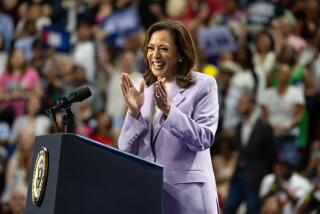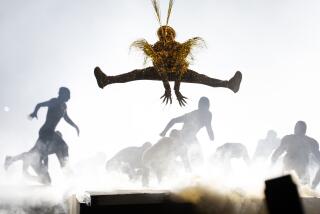It’s the Greatest
- Share via
ATLANTA — For almost four hours in a night dripping with humidity if not humility, cries that the modern Olympics at the end of their first century have fallen prey to commercialism, professionalism and cynicism became distant murmurs.
They were all but drowned out as the Olympic movement unapologetically celebrated itself Friday night from Athens (the one in Greece) to Atlanta. Respectful of the rest of the world but partial to the Deep South, opening ceremonies included enough fireworks to fill three 18-wheelers, 500 cheerleaders, a 300-strong, high-stepping marching band, the roaring engines of 30 pickup trucks and the glorious voice of Georgian diva Jessye Norman.
And, oh yes, the cheers of 83,100 spectators inside the Centennial Olympic Stadium as they greeted the almost 11,000 athletes from 197 countries who paraded before them on the eve of the first day of competition in the 1996 Summer Games.
The biggest cheers, however, were in honor of a 1960 Olympian, Muhammad Ali, who, in a tightly guarded secret, was revealed in a moving moment after midnight as the final torchbearer.
Shaking from his long bout with Parkinson’s syndrome, the former heavyweight champion received the torch from swimmer Janet Evans at the foot of the 116-foot tower leading to the caldron. He lit a fuse to form a fireball that was carried by a pulley to the caldron, where the flame was ignited that will burn over the stadium until the Aug. 4 closing ceremonies.
The Games had officially begun around midnight, when, restricted to the traditional 15-word script, President Clinton said: “I declare open the Games of Atlanta celebrating the 26th Olympiad of the modern era.”
Minutes later, a four-time gold medalist in the discus throw, Al Oerter, carried the flame into the stadium as the 15,000-mile, 43-state torch relay neared its conclusion. The relay began 84 days before at the Los Angeles Memorial Coliseum, the site of the opening ceremonies for two of the three Summer Olympics (1932, ‘84) held in the United States before this one. The other was in St. Louis in 1904.
Oerter passed the torch to Evander Holyfield, a former heavyweight boxing champion from Atlanta who won a bronze medal in 1984. He carried it through the athletes assembled on the field and onto the track, where he was joined by Greek hurdler Paraskevi Patoulidou. Four years ago in Barcelona, she became the first woman from Greece to win a track and field gold medal.
They handed off the torch to Evans, a three-time Olympian who could win her fifth and sixth gold medals here to pass speedskater Bonnie Blair as the most decorated U.S. female Olympian.
Completing the tour of the track, she then ran up a ramp at the north end of the stadium to meet Ali.
That was one of the moments most anticipated by the capacity crowd inside the stadium, many of whom paid the face value of $636 for a ticket, and the estimated 60,000 who watched on a giant television screen at Centennial Olympic Park in downtown Atlanta.
Another was the entrance of the 790 athletes representing the United States. The women wore red blazers and blue skirts, the men blue blazers and white slacks. They all wore white Panama hats.
They were led into the stadium by four-time Olympian Bruce Baumgartner. A 286-pound heavyweight wrestler who is seeking his third gold medal, he had no difficulty hoisting the flag upright.
As the host country, the United States was at the tail of a parade unprecedented in length. The first time that athletes from all countries in the Olympic movement have participated, it took one hour and 27 minutes to complete.
In his opening remarks, Billy Payne, the overseer of the Atlanta Committee for the Olympic Games and its $1.7-billion budget since it upset sentimental favorite Athens to win the bid for the Centennial Games six years ago, called them “the greatest peacetime event in modern history.”
It was left to International Olympic Committee President Juan Antonio Samaranch of Spain to remind the audience, including an estimated 3.5 billion television viewers worldwide, that not all is festive outside the sphere of the five rings.
“We still live in a world where human tragedies persist,” he said in a late addition to his speech, referring to the crash of TWA Flight 800 that claimed 229 lives Wednesday night shortly after takeoff from New York.
Earlier Friday, Clinton delivered a pep talk to the U.S. team at the athletes’ village. An aide said later that Clinton considered calling for a moment of silence for victims of the tragedy but decided that the emphasis of his visit should be on the athletes.
Wearing a USA team jacket and flanked by wife Hillary and daughter Chelsea, he told the athletes: “I want you to mop up and do great. But I want you to realize that just by being what you already are, you are a source of enormous pride to our country and an inspiration to the world. I hope tonight and the next couple of weeks are the greatest time of your life.”
In a light moment after being welcomed to the stage by the beefy Baumgartner, Clinton said: “I was looking at Bruce standing there, obliterating the microphone and the podium. You know what I thought? I thought if I’d had a body like that I’d have done a better job in politics. I should have gone in for wrestling earlier, before I had to do it for a living.”
Despite heightened concern over the president’s security in the wake of the TWA explosion, Justice Department officials said that no extra measures were taken for his visit Friday.
Clinton, sitting between Payne and Samaranch, seemed to enjoy the opening ceremonies, even joining in the wave.
Produced by Don Mischer of Los Angeles, the program with a cast of 5,500 performers combined themes celebrating Ancient Greece, 100 years of Modern Olympic history and the American South.
It was a monumental effort. Even within the portion of the ceremonies dedicated to the local region, there was a wide range. It started with cheerleaders, a marching band and 30 silver pickup trucks, moved to Gladys Knight singing “Georgia on My Mind” and ended with Martin Luther King’s most famous speech, “I Have a Dream.”
Times staff writer Jim Bornemeier contributed to this story.
More to Read
Go beyond the scoreboard
Get the latest on L.A.'s teams in the daily Sports Report newsletter.
You may occasionally receive promotional content from the Los Angeles Times.






